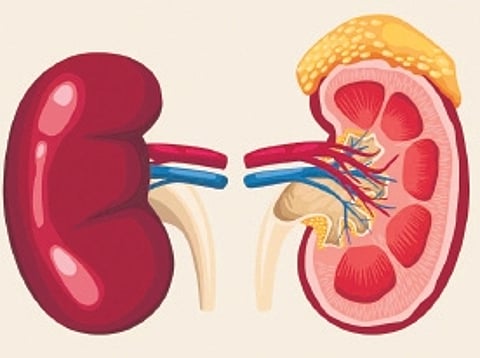

HYDERABAD: Chronic kidney disease (CKD) ranks as the 8th leading cause of death and is estimated to affect more than 850 million people worldwide currently. It is projected to become the fifth leading cause of death by 2040. As March 14 is observed as World Kidney Day, CE approached experts to learn more about kidney diseases, causes, and symptoms.
The approximate prevalence of chronic kidney disease in India is 800 per 10 lakhs of people, while the incidence of end-stage renal disease (ESRD) is 150–200 per 10 lakhs. Speaking about kidney failure cases, Dr Vikranth Reddy, Senior Consultant Nephrologist at CARE Hospitals, stated, “According to renal statistics, the rise in the number of CKD and renal failure cases in India has seen an upward surge. Renal care for kidney failure patients in India is world-class, and dialysis in India is supporting thousands of patients with kidney failure. Renal failure can be caused due to different reasons. Some of them are accidents, over-dosage of drugs like antibiotics, aspirin, and ibuprofen, hypertension, and diabetes.”
Chronic kidney disease, also called chronic renal failure or chronic renal insufficiency, means that for some time, your kidneys have not been working the way they should. The kidneys have the important job of filtering your blood, removing waste products and extra fluid, and flushing them from your body as urine. When your kidneys don’t work properly, wastes build up in your blood and make you sick.
Dr Vikranth Reddy emphasised that chronic kidney disease is caused by damage to the kidneys. The most common causes of this damage are high blood pressure and high blood sugar (diabetes). Other factors that can lead to chronic kidney disease include kidney diseases and infections, such as polycystic kidney disease, glomerulonephritis, pyelonephritis, or a kidney problem you were born with. A narrowed or blocked renal artery, which carries blood to the kidneys, and long-term use of medicines that can damage the kidneys are also contributors. A few examples include nonsteroidal anti-inflammatory drugs (NSAIDs), such as ibuprofen (Advil) and celecoxib (Celebrex).
Initially, chronic kidney disease causes no symptoms. However, as the disease progresses, the body will not get rid of the extra water and toxins, leading to many symptoms and complications. These might include swelling of the feet and legs, elevated blood pressure, poor appetite, nausea and vomiting, tiredness, anemia, and bone disease.
He said that the most important part of prevention is early detection or screening, particularly for people with risk factors. For example, people with diabetes need to have regular check-ups at least every year, including measuring blood pressure and assessing kidney function by conducting blood and urine tests. People with chronic kidney disease can protect their kidneys by taking prescribed blood pressure and other medicines every day, keeping blood sugar in a healthy range if they have diabetes, and changing their diet if advised by their doctor. They should also avoid medicines and herbs that could damage the kidneys and consult their doctor before taking any new medications.
Following a healthy lifestyle is beneficial for people with kidney disease, especially those with diabetes, high blood pressure, or both. It’s important to discuss with a dietitian, diabetes educator, or other healthcare professional about which actions are most important to take.
Discussing medical advancements, Dr Archana Daftardar, Consultant Nephrologist at Renova Hospitals, said, “Recent medical advancements offer many opportunities to prevent or delay disease and mitigate complications such as cardiovascular disease and kidney failure, ultimately prolonging the quality and quantity of life for people living with CKD. Ideally, these new therapies should be universally accessible to all patients, in every country, particularly in low-and-middle-income countries.”
“The inequities emphasise the need to shift the focus towards CKD awareness and providing optimal kidney care worldwide. This requires overcoming barriers at multiple levels, including gaps in early diagnosis, lack of universal healthcare, lack of insurance coverage, low awareness among healthcare workers, and challenges regarding medication cost and accessibility,” she added.
Keep your blood pressure at the target set by your health care provider. Aim for less than 1,500 milligrams (mg) of sodium each day.
If you have diabetes, control your blood glucose level. Good blood glucose control may help prevent or delay diabetes complications, including kidney disease.
Keep your blood cholesterol in your target range. Diet, being active, maintaining a healthy weight, and medicines can all help control your blood cholesterol level.
Take medicines the way your provider tells you to.
If you smoke, take steps to quit. Cigarette smoking can make kidney damage worse.
Get or become more active. Physical activity is good for your blood pressure, as well as your blood glucose and blood cholesterol levels.
Lose weight if you are overweight. Being overweight makes your kidneys work harder. Losing weight helps your kidneys last longer.